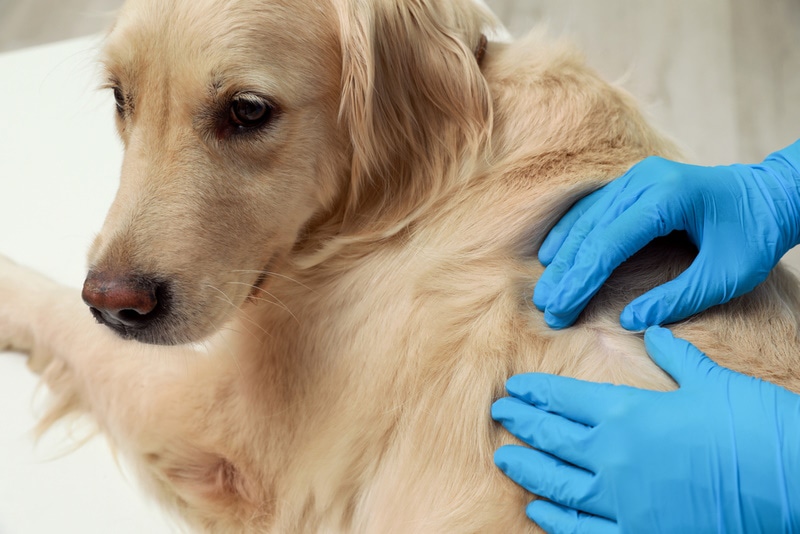Chicken Allergy in Dogs: Vet Approved Causes & Signs
Updated on

Click to Skip Ahead
Have you noticed your dog behaving differently? Maybe they’re scratching themselves more or seem to be having stomach upset issues. This can potentially indicate an allergy. But it can be difficult to distinguish between a food and environmental allergy, and it’s even more tricky to diagnose.
Chicken tends to be one of the most common ingredients that triggers allergies in dogs, with beef and dairy taking the top spots.
Whether your dog has been recently diagnosed or you are just looking for more information, let’s take a closer look at chicken allergies in dogs.
What Are Chicken Allergies?
Cats and dogs can both be allergic to chicken. This is tricky for pet owners because chicken is a primary ingredient used in many pet foods, including wet and dry food and treats.
Allergies are a pronounced immune response to something in a food or the environment that normally shouldn’t be triggered. The body treats the item as a danger to the body, and the reaction to the “invader” is an allergic reaction.

What Are the Signs of Food Allergies, Including Chicken Allergies, in Dogs?
Food allergies most commonly affect dogs in the form of skin signs.
- Itchy, red skin (primarily on the abdomen, groin, paws, ears, and face)
- Scratching ears and shaking head
- Rubbing at face
- Hives
- Rashes
- Hair loss
- Hot spots
- Skin infections
- Ear infections
Food allergies can also show up as digestive issues.
- Nausea
- Vomiting
- Gas
- Diarrhea
Some dogs with food allergies can experience anaphylaxis, which is extraordinarily rare but possible with an allergy. It’s an emergency if your dog exhibits any of the following signs and your dog needs immediate medical attention:
- Sudden and acute vomiting and diarrhea
- Facial swelling
- Difficulty breathing
- Tremors
- Collapse
What Are the Causes of Chicken Allergies?
A food allergy can be determined after a dog eats a specific food and has an immune system reaction that typically shows as skin or digestive problems. Even a tiny amount of the ingredient can trigger allergy signs. The body is having an exaggerated response to what it believes is an invader (which is chicken, in this case), and it reacts by causing various signs.
Once the sensitivity to chicken has developed, the problem usually gets worse. Every time your dog eats anything chicken related, the immune system will respond with stronger allergy signs.
How Do I Care for a Dog With Chicken Allergies?

Getting the proper diagnosis is the first thing, but it’s also tricky to do. Typically, veterinarians must use the process of elimination to figure out exactly what your dog is allergic to.
But once chicken is determined to be the culprit, the allergy signs can be minimized and managed through careful medication and diet planning with the help of your veterinarian.
Some dogs will need allergy medications and topical treatments like medicated shampoos to treat any secondary infections that develop due to the allergy. They might also need medication to treat any gastrointestinal issues. In the long term, though, it’s all about the diet, and you’ll work alongside your dog’s veterinarian to manage the allergy.
Many dog food manufacturers make food that does not contain any chicken protein, though you’ll still need to become an adept reader of ingredient labels. Some foods are advertised as suitable for dogs with sensitive stomachs or allergies but still have chicken in the mix.
Some dogs might also snag a piece of chicken from the table or floor, so there’s always a chance of a relapse, which is why you should be careful when cooking with chicken. Additionally, some dogs with one allergy have the potential to develop a new allergy later.
Frequently Asked Questions (FAQs)
How Can You Tell the Difference Between Environmental and Chicken Allergies?
Food allergies and environmental allergies can present with similar itchy skin signs. Diagnosing allergies in dogs is a process of elimination with no one test being diagnostic, so it is important to work with your vet to get to the bottom of the problem. There are a few clues that can help- if a dog also shows gastrointestinal problems, such as diarrhea, along with itchy skin, there is an increased suspicion of food allergies such as chicken. Also some outdoor environmental allergies, such as pollen, will tend to come and go depending on the season, unlike food allergies which will be present all year round.
Why Do Some Dogs Become Allergic to Chicken?
No one knows for sure, but there seems to be a genetic component involved. In one study looking at data from 825 dogs with cutaneous adverse food reactions, four breeds : German Shepherds, West Highland White Terriers, Labradors and Golden Retrievers, accounted for 40% of affected dogs. Food allergies can crop up at any age but are most commonly seen in dogs under one year of age.
What Proteins Are Good Options for a Dog With Chicken Allergies?
While some dogs with chicken allergies can eat other poultry sources such as turkey with no issues, it is best to stay away from other poultry proteins in case they also trigger a reaction.
Other protein sources such as beef, lamb or rabbit can all be good options. Your vet may recommend a prescription allergy food because those manufacturers don’t make their dog food in the same facility as chicken-based foods and they have other ingredients that can help calm itchy skin. Ideally, you want a food that has no chance of cross-contamination. You’ll see terms like novel source protein (a protein not commonly used, like rabbit) or hydrolyzed protein (the protein is broken down into small sizes, so the body isn’t as likely to recognize it as an allergen).
What Might Cause Itching Other Than Food Allergies?
There are several reasons that a dog will start itching that aren’t from food allergies. One of the most common causes of itching in dogs is flea allergies.
- Environmental allergies: Pollen, mold, and dust mites are common.
- Contact allergies: When dogs come into contact with something like grass, fabric, or soap, it can set off a reaction.
- Dry skin: Some dogs become itchy because of dry skin, which is easily fixable.
- Parasites: Parasites including fleas and mites cause itching, along with hair loss.
- Infection: Bacterial and yeast infections can cause itching.
Conclusion
If your dog has been recently diagnosed with chicken allergies, don’t despair! Making the diagnosis is usually the tricky part, once diagnosed food allergies, such as chicken allergy, can be well managed by avoiding the offending food. Your vet will help you find the right food that your dog will love. In general, food allergies are more manageable than environmental allergies.
Remember to always read the entire nutrition label if you’re shopping for dog food or treats. Chicken has a sneaky way of showing up in many ingredient lists. Speak to your family about what not to feed your dog, and as long as you work with your vet, most dogs with chicken allergies live quite normal and happy lives.
See Also:
Featured Image Credit: New Africa, Shutterstock













